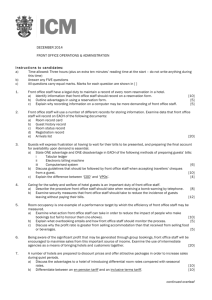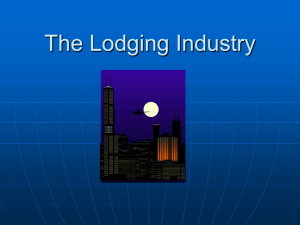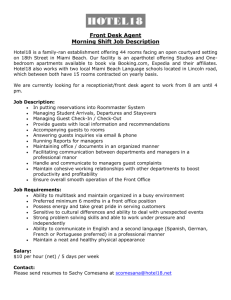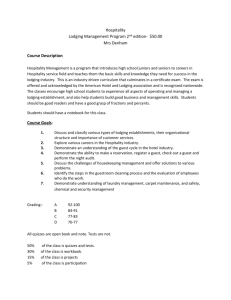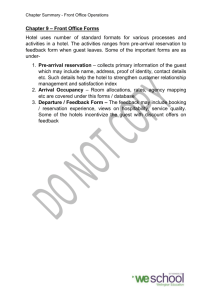Lodging Operations student notes
advertisement
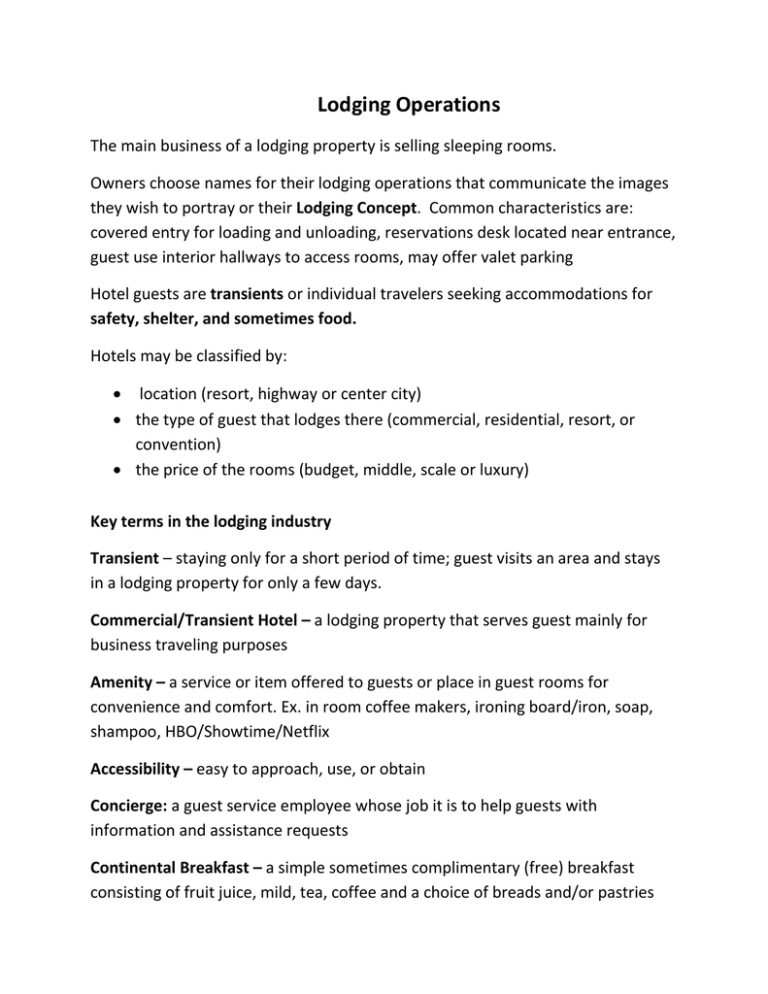
Lodging Operations The main business of a lodging property is selling sleeping rooms. Owners choose names for their lodging operations that communicate the images they wish to portray or their Lodging Concept. Common characteristics are: covered entry for loading and unloading, reservations desk located near entrance, guest use interior hallways to access rooms, may offer valet parking Hotel guests are transients or individual travelers seeking accommodations for safety, shelter, and sometimes food. Hotels may be classified by: location (resort, highway or center city) the type of guest that lodges there (commercial, residential, resort, or convention) the price of the rooms (budget, middle, scale or luxury) Key terms in the lodging industry Transient – staying only for a short period of time; guest visits an area and stays in a lodging property for only a few days. Commercial/Transient Hotel – a lodging property that serves guest mainly for business traveling purposes Amenity – a service or item offered to guests or place in guest rooms for convenience and comfort. Ex. in room coffee makers, ironing board/iron, soap, shampoo, HBO/Showtime/Netflix Accessibility – easy to approach, use, or obtain Concierge: a guest service employee whose job it is to help guests with information and assistance requests Continental Breakfast – a simple sometimes complimentary (free) breakfast consisting of fruit juice, mild, tea, coffee and a choice of breads and/or pastries Clientele – the guests of a specific hotel Room Rate-the price actually charged to a guest for one night’s lodging Rack Rate- the official rate for one night’s lodging at a lodging property Souvenir – item that reminds travelers of a place they visited Hotelier – owner or manager of a hotel Peak/Off-Peak Season – Peak season is the season with the highest demand for services due to highest number of visitors; conversely, Off-Peak season is the lowest demand for services due to small number of visitors I. Types of Lodging properties Commercial hotels- primarily serve tourists and people traveling on business trips. Most of the business is during the week, commercial hotels may offer special weekend packages to increase business Residential hotels-rent apartments for fixed periods of time with food or meals and maid service supplied. Some well-known hotels rent large numbers of suites permanently. Luxury hotels- This hotel offers the highest level of amenities, first-class service, decorator room furnishings and public areas, high-end cuisine and is usually high priced. The luxury hotel usually employs an abundance of service personnel. Convention hotels – a lodging property that mainly serves guests attending large group functions (usually business related) Resort Hotels- are located in vacation and tourist areas such as beaches, mountains, and spas. (Ex. Disney hotels that are on the premises). They provide the pleasure seeker/vacationer high quality comfort, food, and entertainment at rates the middle class can afford. They may be open year-round or seasonally. All- inclusive is a package that provides accommodations + meals. Resort hotels usually have 2 or more different restaurants. Suite – a hotel accommodation that consists of more than one room. Motels are usually known as low-rise, road-side lodging facilities where guest can drive to the front desk office to check in and then drive to their assigned rooms. They are less formal than hotels, tipping is less likely to occur because fewer services are provided. Restaurants are nearby but not on the premises. Bed and Breakfasts Homes and Inns – are often private family homes in which the homeowner has prepared bedrooms and bathrooms to rent to travelers by the day. Guests usually share a bathroom. Continental to full breakfast is provided. Front of the House – area of the hotel in which employees have a lot of interaction with the guests, gift shops and front desk and restaurants are great examples. Back of the House – areas of hotel in which employees have little or no direct contact or interaction with guests. Ex. engineering, accounting II. Hotel Lobbies Sunday, Sept. 15, 2013 Houston Chronicle -Associated Press “Long treated as dead spaces that hotel guests raced through on the way to the elevator, lobbies are being transformed into places to work, surf the Internet or meet friends for a drink.” Some changes are being made to lobbies are: tearing down walls to open spaces, create of small personal work nooks within the great space, communal tables and upgraded wine lists. Why~ people want to see and be seen. Even though they might be traveling alone, they do not necessarily want to feel alone! The average business traveler might spend 90 days a year in hotels. The average hotel room is small and can be claustrophobic. So the guest is much more likely to go sit/work in the hotel lobby or a nearby coffee shop. Marriott is creating “Great Rooms” with free WiFi, comfy seats, menus of small dishes and service of local craft beers. Marriott used a test market and received very positive feedback. So changes will be made in 70% of the 550 Marriott hotels worldwide. With the average cost of a glass of wine at $14.00, bar sales are out growing hotel restaurant sales! A study done by Sheraton Corporation revealed that 15.1 million Sheraton guests used the free WiFi each year and only 5.8 million accessed the on-site gym! In conclusion if the guest is comfortable in the space and surrounded by others, they will stay and spend more money. The average guest is not worried about the price; they are much more interested in staying there and enjoying life! III. Trends in the Lodging Industry – the general direction in which something is moving, in this case it is customers’ preferences Demographic – based on special populations of people Increased number of older Americans has increased number of RVrelated travel, Road Scholar programs (hostel + education) increased number of young people (18 – 24 y.o.) traveling in groups Singles cruises, family cruises, etc. Social – based on change in the structure or beliefs of the society approval of gaming change in family structures from mom/dad/kids to single parent families Lifestyle- based on a change in the way people live their lives healthier foods, more opportunity to exercise impulse purchasing (last minute deals!) Travel for learning and adventure Technological Trends Travelers are more tech-savvy; they carry personal electronic devices with them everywhere. They now expect free Wi-Fi, charging/docking stations, loaners of charging cords, etc. TV remotes in hotel rooms now offer the ability to order room service, control the AC & humidity of the room, and adjust the draperies and lighting too. Travelers blog, Instagram, tweet, etc. about their experiences, both good and bad. Hoteliers need to monitor their digital image and respond constantly to both good and bad comments. There are many on-line booking sites that can help the traveler select lodging, transportation, food/beverage and tours for a discounted rate. Many of these companies as well as hospitality business offer “last minute deals” and “loyalty purchases.” Economic Effects on the Hospitality Industry Recession/ Contraction – a time of slowing down, people lose their jobs, hang onto their money and the hospitality industry suffers Expansion – a time of prosperity, people have money to spend and enjoy on travel, recreation and restaurants. Global Economy – the economies of different nations become interconnected therefore a global recession or expansion can occur having a direct effect on the hospitality industry IV. Who Runs the Property? The Front Office handles everything related to selling sleeping rooms and interacting with guests. Front Office Manager oversees: o o o o Reservations Department (Supervisor or Manager) Reservations – book rooms Sales Agents – book events Front Desk Department (Supervisor or Manager) Front Desk Agents- check guests into and out of property Night Auditors – balance the day’s financial records Uniformed Services Department (Bell Captain) Door Attendants Bell Attendants Parking and Transportation Staff Concierges Telecommunications Department (Supervisor or Manager) PBX Operators – answer incoming calls and in-house calls Housekeeping is the second major department. It is responsible for keeping the hotel clean. The housekeeping department has the largest staff in the hotel. Housekeepers provide the brand of the property! Executive Housekeeper o o Guest Rooms (Assistant Housekeeper) Inspectors Room Attendants Public Areas - House Attendants Laundry (Laundry Supervisor) Laundry Attendants Seamsters-repair all linens Security is critical for all hospitality businesses. Hospitality businesses are attractive targets for criminals. Director of Security Security Officers for Morning, Afternoon and Evening Shifts The Engineering department is responsible for the physical facilities of the hotel. The tasks of the engineering department include maintenance, repairs, deep cleaning, and groundskeeping. Chief Engineer o Skilled Technicians – plumbing, electrical, HVAC o Maintenance Staff- painting, general furniture repair, etc.

